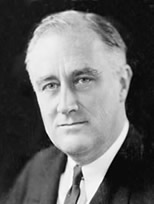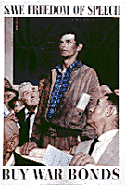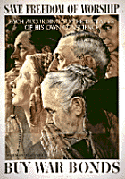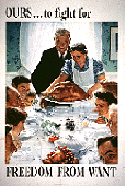This Week in History
January 1 - 7, 1941:
FDR's "Four Freedoms" Speech
Outlines Objectives of U.S. Foreign Policy
January 2012
 Franklin Delano Roosevelt. |
Americans have heard a lot of justifications for war over the past year, not to mention the last decades. In the end, it turned out that each of the wars since World War II, were not being fought for the noble purposes advertised, but rather, on behalf of a concept of utopian world rule, or imperialism, which led the United States, more or less, to disaster. In Korea, we still have troops there after 50 years. In Vietnam, we lost an immoral war. In Panama and Iraq I, we laid waste to two countries in order to "teach a lesson," thereby producing a lot of death and destruction in the countries involved. In Iraq II, the fraud of the so-called justification for the war is abundantly clear, both in terms of the lack of threat represented by the Saddam Hussein regime, and in terms of the clear imperial objectives of the U.S. preemptive war policy.
Under President Barack Obama, the war propaganda and U.S. imperialist aggression have escalated massively. In Libya, U.S. and NATO special forces, drones and war planes assisted Jacobin jihadist rebels to lynch Moammar Qaddafi, his son, and thousands of government officials and others accused of being loyal to Qaddafi. U.S. assistance is now being given to the same Jacobin jihadis in an effort to do the same to the Bashar Assad regime in Syria. The justification offered by the Obama Administration, that these rebels are fighting for "freedom and democracy", is about as truthful as the slogan at the gate of the Auschwitz concentration camp, "work makes you free". In Iran, the U.S. supports the terrorist Mujahedin-e Khalq against the government while running covert assassination operations against nuclear scientists and important military personnel, while U.S. warships are milling around the Strait of Hormuz and Israel threatens to bomb Iran's civilian nuclear power facility in Bushehr, Obama saying to his generals that "it's better if we don't know what Israel is going to do". The same IAEA reports which failed to show any threat of nuclear weapons production in Iran are hysterically cited over and over again as evidence that the threat is imminent, while Obama stridently demands sanctions against all of Iran's trading partners, and Iran prepares to block the strait of Hormuz in the event such sanctions are imposed or Iran is bombed.
In this light, it is of value to go back a little more than 70 years, to President Franklin Roosevelt's Eighth Annual Address to the U.S. Congress, which occurred on Jan. 6, 1941. This speech has been dubbed the "Four Freedoms" speech, because here FDR outlines a broad outline of the objectives of U.S. foreign policy, even as he put the nation on a military-industrial mobilization to aid in preventing a global victory by the Nazis and Japan. The objectives FDR laid out remain valid today, and contrast mightily—especially in practice—with those the current Administration seeks to implement today.
Consider the strategic situation in January 1941. Nazi Germany, by that time, had occupied a large portion of Europe: Poland, Austria, Czechoslovakia, Denmark, Norway, the Netherlands, and Belgium, to give a partial list. France had come under a government friendly to the Hitler, which came to an armistice, under pressure of German arms, and Britain was coming under Nazi bombardment. Italy, under Mussolini, was Hitler's ally. In the Pacific, the fascist Japanese government was at war with China and had occupied Vietnam.
To say that the United States as a democracy, was threatened by the military advance of fascist states, was clearly no exaggeration.
In this context, FDR came to an understanding with British Prime Minister Winston Churchill, over the need for the two nations to collaborate against what would otherwise easily become a New World Order, under a Nazi-Synarchist dictatorship. And the President began to prepare the United States population for the need to join the war against the fascist military threat. It is in this context that he gave his "Four Freedoms" speech, which dealt with the domestic and foreign policy outlook of his Administration, and put forward the following perspective in its conclusion:
Click on each image to view enlargement. By Norman Rockwell ©1943 SEPS: The Curtis Publishing Co., Agent. Printed by the U.S. Government Printing Office for the Office of War Information NARA Still Picture Branch. Use of these images in this webpage is believed to constitute fair use under U.S. copyright law, title 17, section 107 of U.S. code. See http://www.copyright.gov/fls/fl102.html."The nation takes great satisfaction and much strength from the things which have been done to make its people conscious of their individual stake in the preservation of democratic life in America. Those things have toughened the fiber of our people, have renewed their faith and strengthen their devotion to the institutions we make ready to protect.
"Certainly this is no time for any of us to stop thinking about the social and economic problems which are the root cause of the social revolution which is today a supreme factor in the world.
"For there is nothing mysterious about the foundations of a healthy and strong democracy. The basic things expected by our people of their political and economic systems are simple. They are:
"Equality of opportunity for youth and for others.
"Jobs for those who can work.
"Security for those who need it.
"The ending of special privilege for the few.
"The preservation of civil liberties for all.
"The enjoyment of the fruits of scientific progress in a wider and constantly rising standard of living.
"These are the simple, basic things that must never be lost sight of in the turmoil and unbelievable complexity of our modern world. The inner and abiding strength of our economic and political systems is dependent upon the degree to which they fulfill these expectations.
"Many subjects connected with our social economy call for immediate improvement.
"As examples:
"We should bring more citizens under the coverage of old-age pensions and unemployment insurance.
"We should widen the opportunities for adequate medical care.
"We should plan a better system by which persons deserving or needing gainful employment may obtain it.
"I have called for personal sacrifice. I am assured of the willingness of almost all Americans to respond to that call....
"In the future day, which we seek to make secure, we look forward to a world founded upon four essential human freedoms.
"The first is freedom of speech and expression—everywhere in the world.
"The second is freedom of every person to worship God in his own way—everywhere in the world.
"The third is freedom from want—which, translated into world terms, means economic understandings which will secure to every nation a healthy peace-time life for its inhabitants—everywhere in the world.
"The fourth is freedom from fear—which, translated into world terms, means a worldwide reduction of armaments, to such a point, and in such a thorough fashion, that no nation will be in a position to commit an act of physical aggression against any neighbor—anywhere in the world.
"That is no vision of a distant millennium. It is a definite basis for a kind of world attainable in our own time and generation. That kind of world is the very antithesis of the so-called new order of tyranny which the dictators seek to create with the crash of a bomb.
"To that new order we oppose the greater conception—the moral order. A good society is able to face schemes of world domination and foreign revolutions alike without fear.
"Since the beginning of our American history, we have been engaged in change—in a perpetual peaceful revolution, a revolution which goes on steadily, quietly adjusting itself to changing conditions—without the concentration camp or the quick-lime in the ditch. The world order which we seek is the cooperation of free countries, working together in a friendly, civilized society.
"This nation has placed its destiny in the hands and heads and hearts of its millions of free men and women; and its faith in freedom under the guidance of God. Freedom means the supremacy of human rights everywhere. Our support goes to those who struggle to gain those rights or keep them. Our strength is our unity of purpose.
"To that high concept there can be no end save victory."
Related pages:
Interview: EIR Exclusive Interview with Col. Lawrence Wilkerson on the War Danger 12/22/2011
Helga Zepp-LaRouche Issues International Call to Action to Stop World War III November 2011
How Can Anyone Be So Crazy As To Start a Nuclear War? November 2011
Behind London's War Drive: A Policy To Kill Billions November 2011
Threat of World War III : Qaddafi's Death by Lyndon H. LaRouche, Jr.




